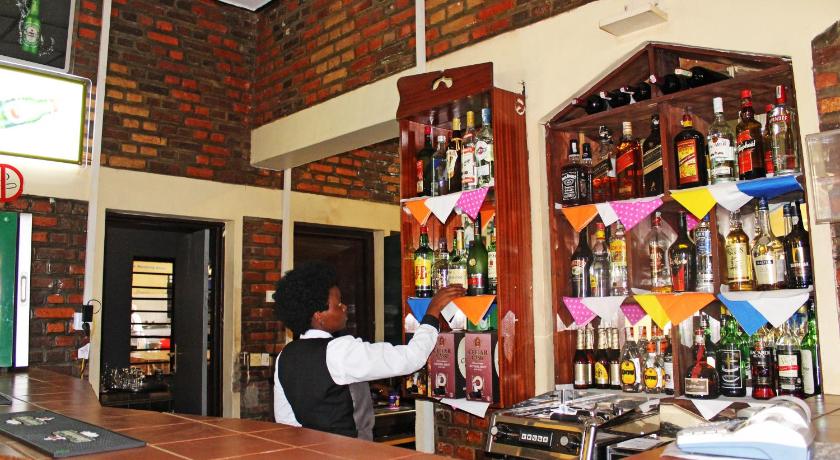
Marie Anne DUSHIMIMANA
Sosthene Musonera owns a Bar-Restaurant at Kimoronko Center, in Gasabo District. Before covid-19, Musonera used to have a daily turnover of Rfw1,000,000.
Before COVID-19, The Bar-Restaurant offered bar services including serving various kind of beer and beverages, as well as food.
The Small business was flourishing until February 2020, when suddenly COVID-19 pandemic erupted and things radically changed.
“I closed the business due to the first lockdown. At the beginning, I thought I was going to close my business for a short time. But due to the pandemic, we reopened 7 months later, offering only foods and not allowed to use the maximum of our capacity,” he said.
However, few months later the businesses were obliged to shut again due to the new variants of COVID-19 including Delta variant.
When the Government of Rwanda launched Economic Recovery Fund, it was a relief to Musonera and other business people to restart over their weakened businesses.
Unfortunately, the journey was not as easy as they used to think.
The Economic Recovery Fund (ERF) was established by the Government of Rwanda to support the recovery of businesses hardest hit by COVID19 so that they can survive, resume operations and safeguard employment, thereby cushioning the economic effects of the pandemic. National Bank of Rwanda was appointed as the Fund Manager.
Generally, Rfw100 Billion have been allocated to Economic Recovery Fund.
“Getting money from Economic Recovery Fund is very difficult especially for us who own small and medium businesses,” he said.
Musonera who usually works with X bank (The name of the bank is hidden for security reasons), told Intego News that he went there to ask the bank management how he can access the fund and he didn’t get the positive feedback.
“The Manager discouraged me telling me that I can’t have access to these funds. I had the option to take another loan which I’m paying on high interest rate,” he explained.
Some of the hard requirements include the proof of payment of insurances to Rwanda Social Security Board for his staff and RRA clearance proof and accountancy documents among others.
“It should be good if they refer on our certificate of registration. After all, anyone can’t work without registering themselves in Rwanda Development Board. At least for hotels and restaurants, they should be the one to distribute the funds,” he said.
Carine Munezero (Not her really name) owns a Motel in Eastern Province. Before COVID-19 she had 4 employees and they delivered room services and restaurant among others.
When COVID-19 erupted and business closed, she reduced staff to 2 employees to take care of the place, as there were no clients at all.
When the ERF was announced, she immediately started to search for information to make sure she can apply to revamp her business.
“I sadly learn that it was a kind of loan paid on low interest. I used to have another loan so I couldn’t ask for it before the end of the first one,” she said.
Another day the bank she works with called her to inform that she can benefit the funds through that bank, but it was very hard to comply with the requirements, she said.
“The manager called and told me that there was money from ERF so I could apply for it. The main challenge were the requirements including having at least 5 employees with the proof of payment of their life insurance at RSSB. I could not afford it because looking at the size of my business and its current status due to the pandemic, I can’t comply with it,” she said.
Furthermore, the banks don’t want to deliver the information related to ERF because if people are granted more from this money, banks consider it as a loss, she added.
“The money should be refundable on zero interest rate. They should also reduce the requirements to be able to include even the startup and small businesses. After all, they have highly been affected by the pandemic more than the big one,” she said.
To be eligible to ERF money, borrowers have to demonstrate negative impacts on their operations caused by COVID-19 pandemic proven by at least 30% of losses based on VAT turnovers submitted to the RRA, being VAT registered and RRA tax clearance certificate as of the end of February 2020, among others.
Beatha Uwurukundo, Finance Manager at Business Development Fund (BDF) told the media that they received money from ERF and they used it to support small businesses and SMEs.
“Normally, it is BDF’s mission to support small businesses and projects through financial institutions we partner with,” said Uwurukundo
so far this institution already used 52% of the Rfw5 billion from National Bank of Rwanda as a part of Economic Recovery Fund, to support businesses affected by COVID-19 pandemic.
“About Rfw2 billion have to pass through SACCOs to support small businesses which don’t exceed a working capital of Rfw1 Million and Rfw3 millions of supporting SMEs affected by COVID-19,” she said.
So far, 4,240 small projects of around Rfw4 Billion have been funded, she revealed.
Teddy Kaberuka an expert in economy said that small businesses have to be remembered and benefit from Economic Recovery fund because they are mostly affected by COVID-19.
“In my opinion as business analyst who often meet business owners affected by the pandemic, it seems like Economic Recovery Fund has been established for the big businesses not for the small ones,” said Kaberuka.
There is a category of people who used to live by doing petty jobs and micro businesses. If there is money, government should think of them too, because they were heavily affected by COVID-19,” he suggested.












